The word ‘Dementia’ describes a group of symptoms (syndrome) linked to a decline in memory or loss of cognitive functioning (thinking, remembering & reasoning), behavioral abilities or other thinking skills severe enough that it interferes with a person's ability to perform his/her daily activities. Other Problematic functional areas include language skills, visual perception, problem-solving, self-management, and the ability to focus and pay attention, controlling emotions and personality changes.
Disease Progression
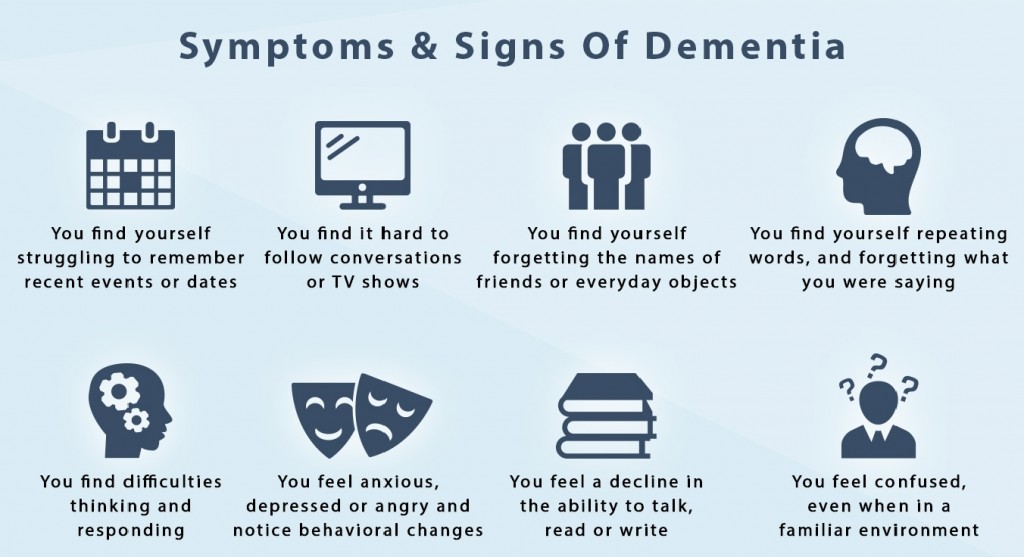
Dementia is progressive; the symptoms start out slowly and gradually get worse. The severity of dementia ranges from the mildest stage when it is just beginning to affect a person's functioning, to the most severe stage, when the person becomes completely dependent on others for basic activities of living.
In the process of aging, the once-healthy neurons in the brain stop working, lose connections with other brain cells, and die. But with dementia patients, the loss is greater. Although dementia is more common among older people (up to 50% of all people aged 85 or older may have some form of dementia), there are many people who live into their 90s and beyond without any signs of dementia. One type of dementia, frontotemporal disorders, is more common in middle-aged than older adults.
Types
Types of Dementia's are based on what they have in common, such as the part of the brain that are affected or whether they worsen over time 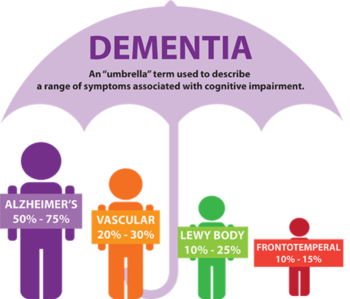 (progressive dementia's). Some dementia's, such as those caused by a reaction to medications or vitamin deficiencies, might improve with treatment. And the other type- Progressive dementia's-
(progressive dementia's). Some dementia's, such as those caused by a reaction to medications or vitamin deficiencies, might improve with treatment. And the other type- Progressive dementia's-
Those that progress and aren't reversible include:
- Alzheimer’s disease
- Vascular dementia.
- Lewy body dementia
- Frontotemporal dementia.
It is also common for people to have mixed dementia—a combination of two or more types of dementia. For instance, a person might have both Alzheimer's disease and vascular dementia.
Causes
Although Alzheimer's disease is the most common cause of progressive dementia in older adults, there are a number of other causes too. Depending on what the cause is, certain dementia symptoms can be reversed. Different types of dementia are associated with particular types of brain cell damage in particular regions of the brain. For example, in Alzheimer's disease, high levels of certain proteins inside and outside brain cells make it hard for brain cells to stay healthy and to communicate with each other.
The brain region called the hippocampus is the center of learning and memory in the brain, and the brain cells in this region are often the first to be damaged. While most changes in the brain that cause dementia are permanent and worsen over time, thinking and memory problems caused by the following conditions may improve when the condition is treated or addressed:
- Depression
- Medication side effects
- Excess use of alcohol
- Thyroid problems
- Vitamin deficiencies
Take a look at the causes of different types of Dementia:
Alzheimer’s: Although the exact cause of Alzheimer's disease isn't known, the following cause is most likely to be:
- Plaques of a protein called beta-amyloid and tangles are fibrous tangles made up of tau protein.
- Genetic factors
Vascular Dementia: It occurs as a result of damage to blood vessels in the brain.
Lewy Body Dementia: It occurs when Lewy bodies (abnormal clumps of protein) that have been found in the brains.
Frontotemporal Dementia: This is a group of diseases characterized by the breakdown (degeneration) of nerve cells in the frontal and temporal lobes of the brain, the areas generally associated with personality, behavior, and language.
Mixed Dementia: Autopsy studies of the brains of Dementia patients aged 80 and older indicate that many had a combination of Alzheimer's disease, vascular dementia, and Lewy body dementia. Studies are ongoing to determine how having mixed dementia affects symptoms and treatments.
Diagnosis:
There is no particular test to determine if someone has dementia. However, doctors diagnose Alzheimer's and other types of dementia based on a careful medical history, a physical examination, laboratory tests, and the characteristic changes in thinking, day-to-day function and behavior associated with each type. Doctors can determine that a person has dementia with a high level of certainty. But it's harder to determine the exact type of dementia since the symptoms and brain changes of different dementias might overlap. In some cases, a doctor may diagnose "dementia" and not specify a type. If this occurs it may be necessary to consult a neurologist or gero-psychologist.

Diagnosing dementia requires that a minimum of two core mental functions be impaired enough to interfere with daily living- such as memory, language skills, ability to focus, paying attention, ability to reason, problem-solving and visual perception. The patient's medical history and symptoms will be reviewed and the doctor will conduct a physical examination.
Doctors are likely to run a number of tests that can help pinpoint the problem including-
- Cognitive and neuropsychological tests
- Neurological evaluation
- Brain scans- CT or MRI.
- PET scans.
- Laboratory tests
- Simple blood tests- such as vitamin B-12 deficiency or an underactive thyroid gland.
- Spinal fluid examination for infection, inflammation or markers of some degenerative diseases.
- Psychiatric evaluation
Genetic Testing for Dementia:
A lot of Personal DNA testing kits from companies like 23andme which claim to reveal a person's chance of developing dementia are now widely available to buy over-the-counter or order online. Their proponents say that it's better to know your dementia risk and thereby be able to make some positive lifestyle changes that could actually reduce it, such as giving up smoking, taking more exercise or eating healthy. But experts remain skeptical about the accuracy and worth of these tests and say that anyone who is worried about inheriting dementia can take simple steps to reduce their risk anyway – without needing to buy a DNA test.
One could go ahead and take these genetic tests if
- they've already been diagnosed with young-onset Alzheimer's or frontotemporal dementia and want to determine if they have one or more of the faulty genes involved
- they have a family history of young-onset Alzheimer's or frontotemporal dementia and would like to know if they also carry one or more of the faulty genes.
Genetic testing is NOT available if one has Vascular dementia, Dementia with Lewy bodies or Late-onset Alzheimer's. However, if one wants to find out if they possess one of the genes associated with late-onset Alzheimer's, an over-the-counter DNA testing kit can be purchased.
Treatment & Care
Treating dementia is based on its cause. While there is no cure or treatment yet for most cases of progressive dementias, including Alzheimer's disease, there are drug treatments that may temporarily improve symptoms. Drugs used to treat Alzheimer's can also be sometimes prescribed to help with symptoms of other types of dementia. Non-drug therapies are also sought to alleviate some symptoms of dementia. Ultimately, the path to effective new treatments for dementia is through increased research funding and increased participation in clinical studies.
The following drugs are used to temporarily improve dementia symptoms.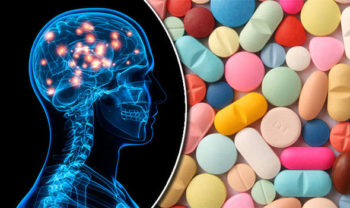
- Cholinesterase inhibitors- donepezil (Aricept), rivastigmine (Exelon) and galantamine (Razadyne) — helps boosts levels of a chemical messenger involved in memory and judgment.
- Memantine (Namenda)- Helps regulate the activity of glutamate- a chemical messenger involved in brain functions, such as learning and memory.
- Other medications to treat other symptoms or conditions, such as stroke, diabetes, depression, high blood pressure, high cholesterol and/or chronic kidney disease.
- Medicines to treat challenging behaviors such as anxiety, agitation, delusions, hallucinations, wandering, aggression and sleep disturbances.
Therapies
Several dementia symptoms and behavior problems might be treated initially using nondrug approaches, such as the following therapies:
- Occupational therapy.
- Music therapy
- Pet therapy
- Aromatherapy
- Massage therapy
- Art therapy
Lifestyle and home remedies:
Dementia symptoms and behavior problems will progress over time. Caregivers might try the following suggestions:
- Modifying the environment by Reducing clutter and noises
- Modifying tasks by Breaking tasks into easier steps
- Enhancing communication
- Encouraging exercise
- Encouraging activity.
- Establishing nighttime rituals.
- Limiting caffeine, discouraging napping and offering opportunities for exercise during the day
- Encourage to keep a calendar.
- Planning for the future- consider financial and legal issues, safety and daily living concerns, and long-term care options.
Alternative medicine
Several herbal remedies, dietary supplements, and therapies have been studied for people with dementia and Some of them are considered beneficial. However, Use caution when considering these since they aren't regulated, and claims about their benefits aren't always based on scientific research.
Dietary Supplements:
- Vitamin E.
- Omega-3 fatty acids
Prevention is Better than Cure, Especially Since There's No Cure Yet.
Although there's no sure way to prevent dementia, there are certain steps you can take that might help. Though More research is needed on this, it might be beneficial to do the following:
- Keep your mind active- Involve in Mentally stimulating activities like reading, solving puzzles and playing word games, and memory training might.
- Be physically and socially active- Move more and aim for at least 150 minutes of exercise a week.
- Quit smoking
- Get adequate vitamin D through certain foods, supplements and sun exposure.
- Lower your blood pressure.
- Consume a healthy diet- rich in fruits, vegetables, whole grains, and omega-3 fatty acids.
Health systems globally struggle to provide adequate coverage of diagnostic and treatment services for patients with dementia. Care is often fragmented, uncoordinated, and unresponsive to the needs of these people. The demographics of the escalating problem have led researchers to estimate care costs over the coming decades. In EU countries that had 7.22 million people living with dementia in 2008, estimated to increase to 14.3 million by 2050, costs are projected to increase to €250 billion by 2030 for the whole of Europe (Wimo et al. 2009). In the USA, dementia is one of the most challenging and costly to treat diseases with $277 billion projected to be spent on dementia care by the end of 2018 (Alzheimer’s Association 2018). In the UK, the total cost of dementia to society was £26.3 billion (2017) projected to reach £55 billion by 2040 (Prince et al. 2014).
In most countries around the world, the management and economic support for dementia care are mainly provided by the extended kin. Given the many years of dementia progression, informal costs of care can cause distress to families and lead them into financial hardship. UK estimates show that out of the total £26.3 billion spent for dementia care in 2017, £11.6 billion were contributed by the work of unpaid carers and family members, while only £4.3 billion were spent by healthcare sector and £10.3 billion by social care (publicly and privately funded) sector. In the USA 16 million people provided unpaid care in the form of physical, emotional and financial support – a contribution to the nation valued at $232 billion (2017) (Alzheimer’s Association 2018).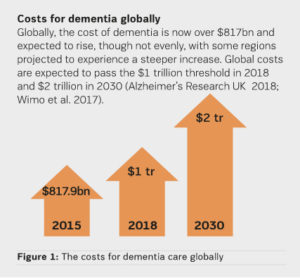
These sobering estimates should drive intensified national and global action to help improve medical and public health interventions for dementia, as well as social and wider public policies. National authorities and societies not adequately preparing to address dementia will be severely disadvantaged both in societal and financial burden.
The Cost of Dementia Care in 2018A recent study by Northwest Mutual Insurance discovered that caregivers in the United States are spending more money on caring while financially planning less. The study found that 7 in 10 caregivers reported lowering their own spending to be able to pay for caregiving costs for a parent or senior loved one.
The 2018 Costs, Accountabilities, Realities and Expectations (C.A.R.E.) The study polled Americans on many aspects of caregiving and longevity. The study examined four categories of long-term care planning, including- Costs, Accountabilities, Realities, and Emotions.
Facts and figures from the C.A.R.E. report:
- Average expenses included $273 per month, spent on medical supplies and $159 per month on food.
- 67% of caregivers reported reducing their own living expenses to pay for caregiving costs (this number was up from 51% last year).
- 57% of future caregivers expect to have personal costs of providing care, but 48% have not planned financially (a jump from only 35% last year).
- 53% of American caregivers say the caregiving situation was not planned and many were financially unprepared for the event.
- Only 48% of caregivers reported that they were financially ready to provide financial support.
- 34% of current caregivers report their monthly spending on caregiving-related expenses between 21-100% of their budget.
Dementia Research 2018:
Contemporary Dementia research spans a huge range of subject areas including aging, gerontology, developmental research, neuroscience, social science, ethics, law, engineering, architecture, and even environmental research. The academic literature reports on prevention, screening, early detection, treatment of symptoms, and end-of-life care
- A roadmap to advance dementia research in prevention, diagnosis, intervention, and care by 2025: National and global dementia plans have focused on the research ambition to develop a cure or disease‐modifying therapy by 2025, with the initial focus on investment in drug discovery approaches. The authors set out to develop complementary research ambitions in the areas of prevention, diagnosis, intervention, and care and strategies for achieving them. Alzheimer's Society facilitated a task force of leading UK clinicians and researchers in dementia, UK funders of dementia research, people with dementia, and carer representatives to develop, using iterative consensus methodology, goals and recommendations to advance dementia research.
- Alzheimer's disease: mounting evidence that herpes virus is a cause: Strong evidence has emerged recently for the concept that herpes simplex virus type 1 (HSV1) is a major risk for Alzheimer’s disease (AD). This concept proposes that latent HSV1 in the brain of carriers of the type 4 allele of the apolipoprotein E gene (APOE-ε4) is reactivated intermittently by events such as immunosuppression, peripheral infection, and inflammation, the consequent damage accumulating and culminating eventually in the development of AD
- Alzheimer's vaccine could cut dementia in half, human trials may be next- An experimental vaccine that could hold off Alzheimer's disease showed promising results in animal testing, according to researchers at the University of Texas Southwestern Medical Center. Testing in mice showed that the vaccine safely prevents the buildup of substances in the brain associated with the fatal disease.
- A Comprehensive Model of Factors Associated With Subjective Perceptions of “Living Well” With Dementia- New research has identified the factors that enable people with dementia and their carers to live as well as possible. Led by the University of Exeter, the research seeks to inform support services and guide policy on where resources should be spent to support the 50 million people worldwide that have been diagnosed with dementia to optimize their ability to "live well".
- Carotid Artery Wave Intensity Measured in Mid- to Late-Life Predicts Future Cognitive Decline: The Whitehall II Study- Accumulating evidence suggests that vascular risk factors may contribute to the development of dementia. Increased pulse pressure (PP) is hypothesized to impair cognitive function due to its damaging effect on the fragile cerebral micro-circulation, but a direct relationship between the intensity of pulse waves traveling towards the brain and subsequent impairment in cognitive function has never been investigated. Wave intensity analysis allows the measurement of both the magnitude and direction of travel of waves within the common carotid artery, and may, therefore, represent a novel risk factor for future cognitive decline.
Some Latest News on Dementia:
- Dementia risk: Five-minute scan 'can predict cognitive decline- A five-minute scan could be used to spot people at risk of dementia before symptoms appear, researchers claim. Scientists used ultrasound scanners to look at blood vessels in the necks of more than 3,000 people and monitored them over the next 15 years. They found those with the most intense pulses went on to experience greater cognitive decline over the next decade than the other study participants. Researchers hope it may offer a new way to predict cognitive decline.
- Regular Exercise Boosts Executive Function in Adults at Risk for Dementia- In a randomized clinical trial of exercise and diet in 160 sedentary adults with mild cognitive impairment but no dementia (CIND) and cardiovascular risk factors, regular aerobic exercise three times a week for 6 months resulted in significant improvements in executive function, but not in memory or language/verbal fluency domains.
Right now, volunteers are sought to participate in clinical studies and trials about Alzheimer's and other dementias. To name a few:
- Developing new ways to study and test treatments for small vessel disease in vascular dementia
- Memory Improvement Through Nicotine Dosing (MIND)
- Investigating a potential target for the treatment of frontotemporal dementia
- Understanding whether drugs for rheumatoid arthritis can reduce the risk of Alzheimer’s disease
- Alzheimer's Disease Neuroimaging Initiative 3 (ADNI3)
- Developing potential new treatments for Alzheimer’s disease
- A clinical trial to test potential treatments for a major cause of vascular dementia
Dementia Research & Future- Treatment, Research & Events Coming up:
- The first phase of human trials for promising ultrasound treatment for dementia is set to commence late in 2019. An extraordinarily promising new technique using ultrasound to clear the toxic protein clumps thought to cause dementia and Alzheimer's disease is moving to the first phase of human trials next year. The innovative treatment has proven successful across several animal tests and presents an exciting, drug-free way to potentially battle dementia.
- The Clem Jones Centre for Ageing Dementia Research (CJCADR) is driven by the insight that fundamental, basic research is required to provide a solution to neurodegenerative diseases, in particular, those affecting older people, including Alzheimer's disease. Primarily established to support fundamental brain research at a cellular and molecular level, CJCADR discoveries are moving toward clinical studies and trials. The researchers are developing a pioneering ultrasound technique that could delay the effects of dementia. A phase I clinical safety trial involving a small number of patients, which is planned for commencement late in 2019, will explore whether the technique discovered at UQ’s Queensland Brain Institute (QBI) in 2015 is safe to use in the fight against Alzheimer’s disease. The technology, which temporarily opens the blood-brain barrier enabling the clearance of toxic protein plaques from the brain, has successfully reversed Alzheimer’s symptoms and restored memory function in animal models. The phase I clinical safety trial planned for late 2019 is the next step in the development pathway to bring this exciting technology from initial discovery to application.
- World Congress- Dementia 2019: Reconnoitering the Challenges in the Era of Dementia Research and Care- Dementia 2019 is an international congress which expects more than 50 speakers and more than 100 participants from all across the world. Dementia 2019 will provide you chance to get exposure with the latest research and technology developing in the field of Dementia and Alzheimer’s disease. This is the perfect stage to grow your research incite and participate in the scientific discussion. Along with this Dementia, 2019 will help the participant to develop an international academic and business network. The main focus of the conference will be on Alzheimer’s disease, Dementia, Imaging Techniques associated with Biomarkers, Various Animal models, Geriatrics and Cognitive Disorder, Pathophysiology, Care practice and Awareness, Current Trends and Awareness in Dementia and Alzheimer.
- Innovations and State of the Art In Alzheimer's & Dementia Research -The Innovations and State of the Art In Alzheimer's & Dementia Research is an excellent opportunity for the delegates from universities and institutes to interact with the world class neurologists, psychiatrist, neuroscientists, nutritional scientists, neurosurgeons, healthcare clinicians, researchers. It features scientific sessions focusing on the tracks such as Alzheimer disease, neuropsychology & neurophysiology, brain infection, dementia due to HIV infection, dementia in head injury, and much more.
- Alzheimer's Association International Conference (AAIC 2019) - AAIC is the largest and most influential international meeting dedicated to advancing dementia science. During AAIC 2019, international investigators, clinicians, and care providers are expected to gather to share the latest study results, theories, and discoveries that will help bring the world closer to breakthroughs in dementia science.
Dementia Care/Treatment in the Future:
Telemedicine is emerging as an effective way to provide consultation and care to rural residents who may not have access to specialty services. Telehealth and smart technologies reducing Dementia burden by providing the following to help patients remain independent:
Telehealth and smart technologies reducing Dementia burden by providing the following to help patients remain independent:
- wayfinding,
- tracking
- navigation technology
- monitoring systems (so caregivers can stay alert to any changes)
- Easier online access to support materials and information.
A “city” for people with dementia:
An average nursing home can be depressingly institutional, For the growing number of people suffering from dementia, these facilities can be even worse. 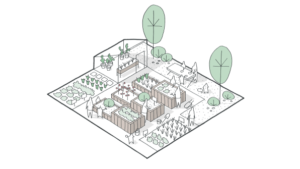 Their repetitive architecture makes it easy to get lost, and they look nothing like the places where patients have lived their entire lives. The Copenhagen-based firm Nord Architects is building a series of centers for patients with Alzheimer’s and dementia that feel more like villages or cities, rather than bleak institutions.
Their repetitive architecture makes it easy to get lost, and they look nothing like the places where patients have lived their entire lives. The Copenhagen-based firm Nord Architects is building a series of centers for patients with Alzheimer’s and dementia that feel more like villages or cities, rather than bleak institutions.
Robots Could Help People With Dementia
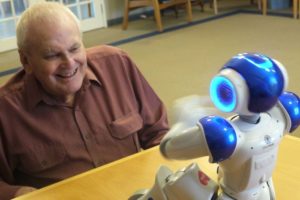 A team of international scientists is exploring the ways robots can help people living with dementia. According to them, the burden on caregivers of people with dementia is very high and caregivers often need a break during the day to get other things done. Robots can help provide extra care. They believe that these robots can also keep a watchful on eye on a parent or senior loved one for long-distance caregivers, help patients get in and out of bed and remind them to take medication.
A team of international scientists is exploring the ways robots can help people living with dementia. According to them, the burden on caregivers of people with dementia is very high and caregivers often need a break during the day to get other things done. Robots can help provide extra care. They believe that these robots can also keep a watchful on eye on a parent or senior loved one for long-distance caregivers, help patients get in and out of bed and remind them to take medication.
Sources: https://www.alz.org/alzheimers-dementia/what-is-dementia https://www.mayoclinic.org/diseases-conditions/dementia/symptoms-causes/syc-20352013 https://www.nia.nih.gov/health/what-dementia https://newatlas.com/ultrasound-dementia-alzheimers-human-trials/57725/ https://theconversation.com/amp/alzheimers-disease-mounting-evidence-that-herpes-virus-is-a-cause-104943 https://chicago.suntimes.com/working/mold-toxicity-goes-undiagnosed-for-millions/ https://www.news-medical.net/news/20181224/Research-identifies-factors-that-help-dementia-patients-and-their-carers-to-live-well.aspxhttps://blog.pokitdok.com/dementia-care/ https://www.fastcompany.com/90220683/this-city-for-people-with-dementia-is-the-future-of-memory-care https://www.alzheimers.net/robots-could-help-people-with-dementia/ https://www.ncbi.nlm.nih.gov/pmc/articles/PMC6033035/ https://journals.lww.com/alzheimerjournal/Abstract/publishahead/A_Comprehensive_Model_of_Factors_Associated_With.99398.aspx https://healthmanagement.org/c/healthmanagement/issuearticle/shaping-the-future-of-dementia-care https://www.bbc.com/news/health-46155607 https://www.medpagetoday.com/neurology/dementia/77091?xid=nl_mpt_DHE_2018-12-26&eun=g436715d0r&pos=&utm_source=Sailthru&utm_medium=email&utm_campaign=Daily%20Headlines%202018-12-26%202018-12-26&utm_term=NL_Daily_DHE_Active







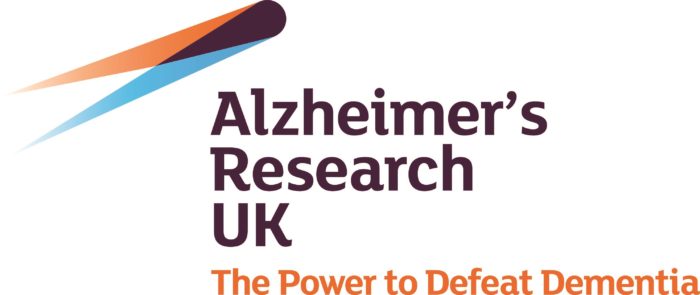


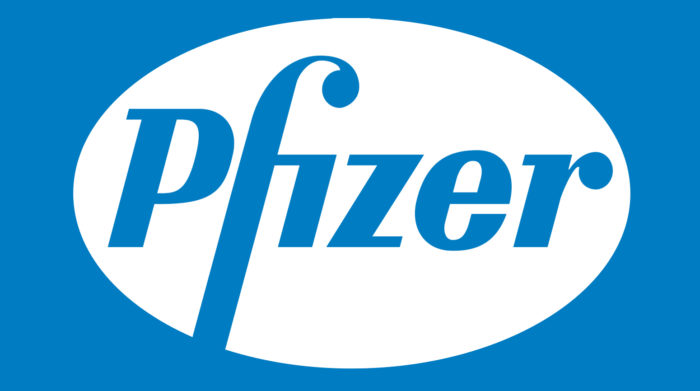
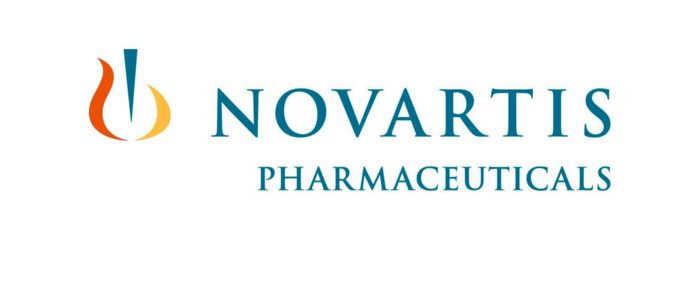



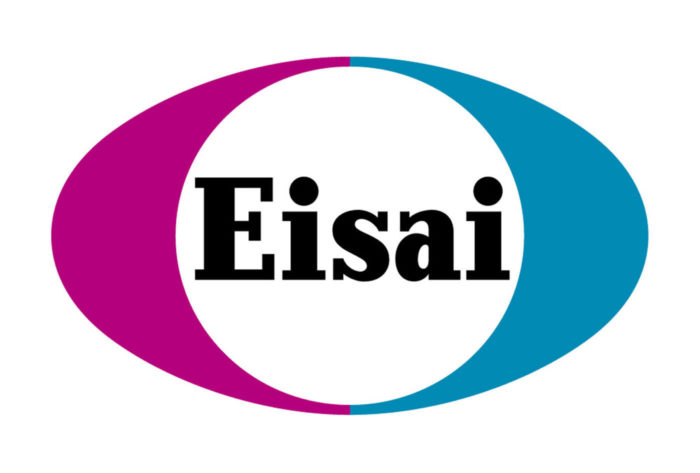


Leave a Reply